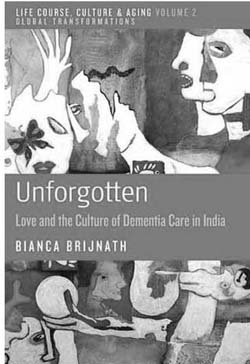Unforgotten is the product of Bianca Brijnath’s doctoral research at Monash University. It can be considered as a significant contribution to anthropological literature on ageing, dementia and its care in India. Though her research is limited to urban middle class (which she acknowledges as a limitation), it is truly revealing in terms of the confined participants and their lived experience with dementia and sevâ. Sevâ a concept which Brijnath explores in all its forms and layers as care work is shaped in everyday family life centred on cooking, feeding and eating; in doctor shopping and looking for an ilâj or cure; and bearing the attended expenses. Sevâ apart from care also means acts of normalization of pesky behaviour and bodies in negotiating the social world to avoid stigma. Sevâ is patterned by kinship relations, socio-cultural norms (e.g., women doing sevâ to their in-laws) or attachments over time (as in paid care). Through the concept of sevâ the author invokes ideas of love, devotion, duty, shared memory and reciprocity. Thus sevâ also means fulfilling the last wishes and fighting to the end. Moreover the author’s sensorial approach to anthropology pays dividends especially in exploring the aspects of sevâ in terms of caring for the elderly with dementia in case of loss over bodily functions, the emotional toll it takes on the caregiver; and also the affective valence attached to food and feeding. As an extension Brijnath attempts to make readers ‘smell the writing’ in her hermeneutic inquiry to ‘understand the dialectic between care practices and the discourse that frame them.’

Love, Memories And Care
Anindya Das
UNFORGOTTEN: LOVE AND THE CULTURE OF DEMENTIA CARE IN INDIA by By Bianca Brijnath Berghahn Books, New York, 2014, 240 pp., $95.00
June 2016, volume 40, No 6
